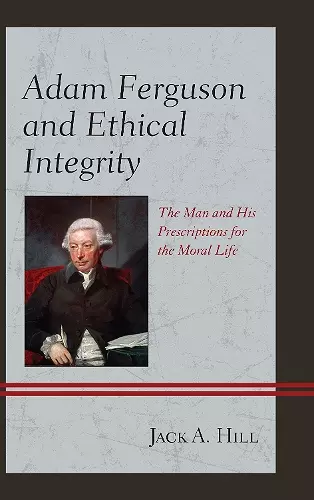Adam Ferguson and Ethical Integrity
The Man and His Prescriptions for the Moral Life
Format:Hardback
Publisher:Lexington Books
Published:3rd Jan '17
Currently unavailable, and unfortunately no date known when it will be back

This book is about learning how to live the good life. Part biography and part philosophical inquiry, it is a fresh, original interpretation of the intellectual world of the largely forgotten, eighteenth-century professor, Adam Ferguson. Although less well-known today than his famous Scottish contemporaries, Adam Smith and David Hume, Ferguson was considered their equal in the 18th century. The book shows how Ferguson, who grew up speaking Gaelic and English, and spent a decade ministering to a Highlander regiment, developed a distinctive, cross-cultural approach to moral philosophy that is relevant for doing comparative ethics in today’s global village. The premise is that life in the twenty-first century is plagued by a moral disorientation that has affinities with the materialism, privatization, social fragmentation and spiritual crises that were emerging in 18th-century, urban Scotland. Like his peers in medical science, Ferguson pursued what was then known as moral science with a particular concern to diagnose and treat moral “dis-ease.” The book contends that his moral philosophy lectures became strikingly modern experiments in recovering moral moorings—disclosing epitomes of moral dynamics, investigating the use of moral terms in ordinary language, and crafting moral principles, such as probity, which preserved classical moral virtues but also incorporated the practical wisdom of ‘peoples of the mountains.’ Although focused on re-discovering Ferguson as a full-blown ethicist before his time, the book is also intended as a primer for the reader’s own quest for living a life which is emblematic of ethical integrity The primary audience for this book is philosophers, historians, religious studies scholars who specialize in ethics, eighteenth-century English literature scholars, and social scientists (anthropologists, sociologists and political scientists) who focus on the eighteenth-century.
A thoughtful and well-documented study of Ferguson as a moralist, searching for a path to virtue and happiness in a world of commercial self-interest, religious uncertainty, and threats to national security. -- Richard B. Sher, New Jersey Institute of Technology
Compared to his contemporaries David Hume and Adam Smith, Adam Ferguson is a thinker waiting to be re-discovered. With a keen eye to modern relevance no less than historical interest, Jack Hill has done a fine job of introducing Ferguson’s life and thought to a new readership. -- Gordon Graham, Princeton Theological Seminary
Professor Hill's study of Ferguson is a most welcome publication. It reorients our understanding of Ferguson's ethical thought away from the youthful Essay on the History of Civil Society and towards the less well studied Principles of Moral Philosophy and in so doing creates a more sophisticated, nuanced and holistic portrait of a central figure in the Scottish Enlightenment. But Hill also takes seriously the substance of Ferguson's 'moral anthropology' by teasing out how the lessons taught by a professor of Moral Philosophy in Edinburgh University in the late eighteenth century still resonates for those of us living in the early decades of the twenty-first century. There is much recent academic concern expressed about how the values of the Enlightenment might apply today— Hill's book illustrates how to how this might be done in a historically sensitive, religiously informed and philosophically sensitive manner. -- Michael Brown, University of Aberdeen
Jack Hill’s new book on Adam Ferguson represents a major contribution to the study of Ferguson and the wider Scottish Enlightenment. Adam Ferguson and Ethical Integrity: The Man and His Prescriptions for the Moral Life places the study of Ferguson’s ethical commitments and philosophical interests at the center of its interpretation of this leading Enlightenment thinker. Skillfully blending biography, historical and intellectual context, and a renewed focus on the importance of Ferguson’s final major work The Principles of Moral and Political Science, Jack Hill offers a reading of Ferguson that stresses his commitment to ethical inquiry and pedagogy. It both restores Adam Ferguson to his rightful place at the forefront of the Scottish Enlightenment and demonstrates the relevance of his philosophical project for contemporary ethical thinking. -- Craig Smith, University of Glasgow
In this, the first serious exploration of Adam Ferguson as a moralist, Jack Hill has delivered a thoughtful and illuminating account of those aspects of this important Scottish philosopher's work that mattered most to his students and his contemporaries. Hill shows how Ferguson's distinctive origins and upbringing in eighteenth-century Scotland shaped a peculiarly complex moral outlook that remains of relevance to twenty-first-century readers, emphasizing the cardinal principle of probity in guiding ethical conduct. This study also demonstrates how sensitivity to cultural difference marked Ferguson's moral teaching and how it became the underpinning for one of the first truly sociological perspectives on the human condition. Hill's is an original and provocative reading of a key Enlightenment theorist of behavior in social settings whose subtle and persuasive moral arguments have been unjustly overlooked and it is sure to attract both attention and controversy. -- David Allan, University of St. Andrews
ISBN: 9781498504577
Dimensions: 237mm x 160mm x 23mm
Weight: 653g
308 pages